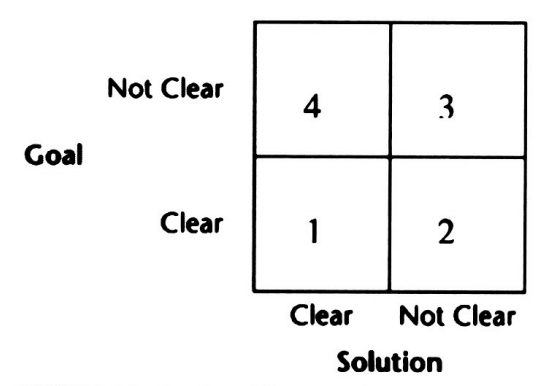2 minutes
Project management vs System Inquiry
From my previous studies in the module T848 in The Open University, I was introduced to quadrants in project management approaches. According to (Fernandez, 2016), a project is classified according to a binary answer to two characteristics: goal and solution, as summarised in figure (2):

Figure 2: Project characteristics quadrants. Extracted from (Fernandez, 2016)
We can appreciate the similarities of a project with unclear goal and unclear solution with the words of (Ison, 2010): “Thus, unlike most projects, a systemic inquiry does not specify outcomes or deliverables before it starts – though it may specify process or timing milestones – and thus maintains an openness to surprise, adaption and an underlying emotion of uncertainty…” (Fernandez, 2016) adds that in quadrant 3, no business value is guaranteed and introduces a variation of project managing with shorter linear and template-based solutions. I agree, therefore, with (Ison, 2010) rationale and critique of a “projectified” world.
In my opinion, we should be able to deal with complex situations, even if the outcome is uncertain, although we should allow for some templates or project management techniques to take control in some of the subsystems of our system of interest.
A system inquiry, as described in the examples of the book (Ison, 2010) is a time consuming and demanding process, with several iterations. We should add that society is not used to confront problems in a systemic approach. Therefore we should benefit from the shortcuts provided by the project management techniques and incorporate those tools in our systems. We can expand on its importance, considering current management as a social technology, therefore, will be counter-intuitive not to use those techniques and allow members of the team to the benefit of the structure and easy-of-mind provided by project management.